10 Healthy Fat Foods That You Should Be Eating!
By Mansi Shah +2 more

Get,

to manage your symptom
Get your,


4 Cr+ families
benefitted

OTP sent to 9988776655



You’ve successfully subscribed to receive
doctor-approved tips on
Whatsapp

Get ready to feel your best.

Hi There,
Download the PharmEasy App now!!


Register to Avail the Offer
Send OTPBy continuing, you agree with our Privacy Policy and Terms and Conditions

Hi There,
Sign up on PharmEasy now!!
Trusted by 4 crore+ families

OTP sent to 9988776655



You have unlocked 25% off on medicines




Code: NU25
By Mansi Shah +2 more
Table of Contents
For many years, dietary fat has been viewed with caution. However, evolving research14 suggests that not all fats are the same, and certain types may actually support overall health when consumed in moderation as part of a balanced diet.
Monounsaturated and polyunsaturated fats are naturally present in foods like nuts, seeds, avocados, and certain oils, may offer properties that support heart health and help maintain stable energy levels. These fats are also a source of essential nutrients and may contribute to general well-being.
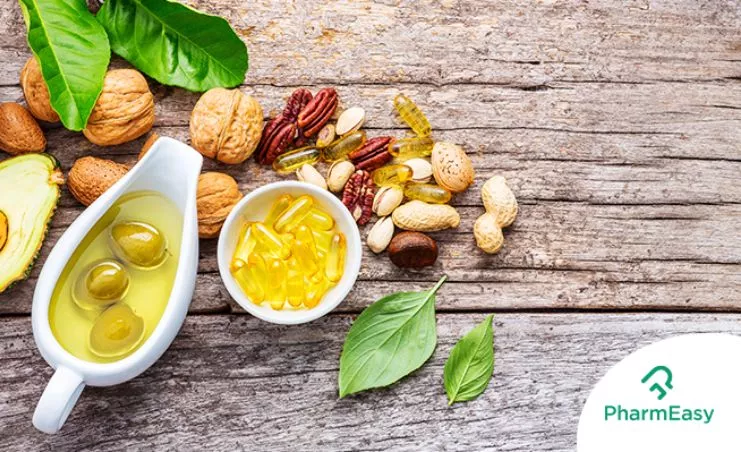
On the other hand, saturated fats and trans fats often listed as “hydrogenated oils” on food packaging, are commonly found in processed or packaged foods. When consumed in excess, these types of fats may be linked to less favourable health outcomes and are best limited in the daily diet.
Choosing the right types of fats and consuming them in appropriate amounts may be a valuable part of maintaining a healthy lifestyle. However, it is important to speak with a healthcare professional before making any significant dietary changes, especially if you have existing health conditions or are on medication.

Contrary to popular belief, butter may be suitable for consumption when included in moderation. It contains fat-soluble vitamins such as Vitamin D and also provides certain polyunsaturated fats like omega-6. Butter may help support the absorption of nutrients from other foods as part of a balanced diet1.
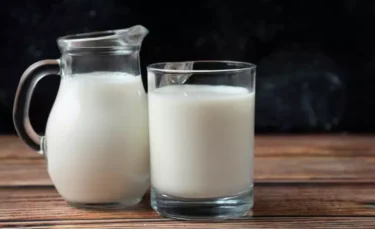
Full-fat dairy is once again gaining attention. While it is nutritionally similar to low-fat and skimmed varieties, full-fat milk and its products may offer fat-soluble vitamins such as Vitamin A and D in notable amounts2.
Although controversial, dairy products are often termed ‘superfoods’ as most of them contain probiotics. Among them, fermented dairy products like yoghurt may have beneficial effects on cardiovascular health11.
Dr. Siddharth Gupta, B.A.M.S, M.D (Ayu)

Coconut contains saturated fats, which are often viewed with caution. However, research3 suggests that the fatty acids in coconut and its products may be metabolised differently, as they are directed to the liver for processing. Some studies3 indicate that coconut may support satiety and may have an effect on metabolic activity.

Dark chocolates are abundant in antioxidants, which helps in lowering blood pressure and is good for the heart. It may also improve brain function and may help protect against skin damage4.
Did you know dark chocolate may have antitussive properties that might help to relieve cough in some people? Some studies12 suggest that eating dark chocolate may help suppress the urge to cough and may have soothing effects.
Dr. Rajeev Singh, BAMS
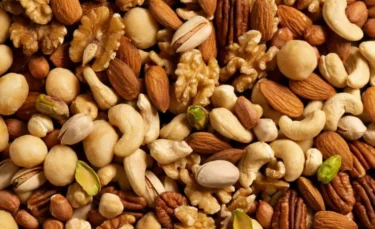
Nuts are full of fibre and nutrients like vitamin E, magnesium, and protein. They may be beneficial in supporting metabolism and heart health. Almonds and walnuts, in particular, may provide unique advantages compared to other types of nuts5.

Olives are the cornerstone of the Mediterranean diet, and olive oil, derived from them, may offer numerous benefits. Rich in antioxidants and vitamins E and K, olive oil may support heart health and may help maintain healthy blood pressure levels6.

Egg yolk is known for being rich in fats and cholesterol; however, research7 suggests that this may not have a significant effect on the body’s cholesterol levels. Eggs are a good source of nutrients that may support brain function and heart health. Additionally, they may play a role in supporting weight management when included in a balanced diet7.
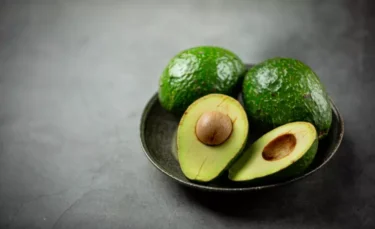
Avocados are rich in fat, but they are also an excellent source of fibre, monounsaturated fats, and heart-healthy cholesterol. Avocados may support overall health and may have potential benefits in managing weight when included as part of a balanced diet8.

Salmon, tuna, trout, sardines, and mackerel are rich in protein and may offer benefits for cardiovascular health. When included as part of a balanced diet, fish may provide unique advantages over other types of meat9.
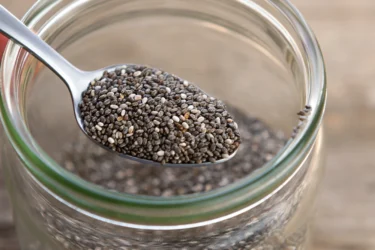
Chia seeds might not be the first food that comes to mind when thinking of fatty foods, but they are actually a dense source of healthy fats. Chia seeds may offer potential benefits in supporting healthy waist size and blood pressure when included in a balanced diet. They are also a great source of fibre, which makes up a significant portion of their carbohydrate content. An alternative with similar benefits is flax seeds10.
In addition to healthy fats, chia seeds are a rich source of protein, carbohydrates, and dietary fibre. They also contain various vitamins, minerals, phytochemicals, and antioxidants. These nutrients may contribute to overall health when included as part of a balanced diet13.
Dr. Smita Barode, B.A.M.S, M.S.
Also Read: High Dietary Fiber Foods That You Should Eat Every Day!
For a long time, fats in foods have been viewed negatively, with many people believing that low-fat equals healthy. However, our bodies need fats to function properly, as they are one of the three essential macronutrients (along with carbohydrates and proteins). The concern lies in the modern diet, which is often high in saturated and trans fats, both of which are linked to less favourable health outcomes, particularly trans fats.
Monounsaturated and polyunsaturated fats, on the other hand, are generally regarded as healthier fats. These fats are linked to improved cholesterol levels (particularly lowering bad cholesterol, or LDL) and may help maintain balanced insulin levels. Foods rich in healthy fats typically contain higher levels of monounsaturated and polyunsaturated fats and lower or no amounts of trans or saturated fats3.
Also Read: 15 Amazing Health Benefits of Ghee
Incorporating healthy fats into a balanced diet is essential for overall well-being. While it is important to limit saturated and trans fats, adding monounsaturated and polyunsaturated fats to your diet may offer a range of health benefits, including supporting heart health and helping to maintain balanced cholesterol and insulin levels. By choosing foods rich in these healthy fats, such as avocados, nuts, and fish, and consulting with a healthcare professional, you can make informed choices that promote long-term health.
Also Read: Best Summer Foods to Keep Your Body Cool
Disclaimer: The information provided here is for educational/awareness purposes only and is not intended to be a substitute for medical treatment by a healthcare professional and should not be relied upon to diagnose or treat any medical condition. The reader should consult a registered medical practitioner to determine the appropriateness of the information and before consuming any medication. PharmEasy does not provide any guarantee or warranty (express or implied) regarding the accuracy, adequacy, completeness, legality, reliability or usefulness of the information; and disclaims any liability arising thereof.
Comments

Leave your comment...
You may also like
Comments